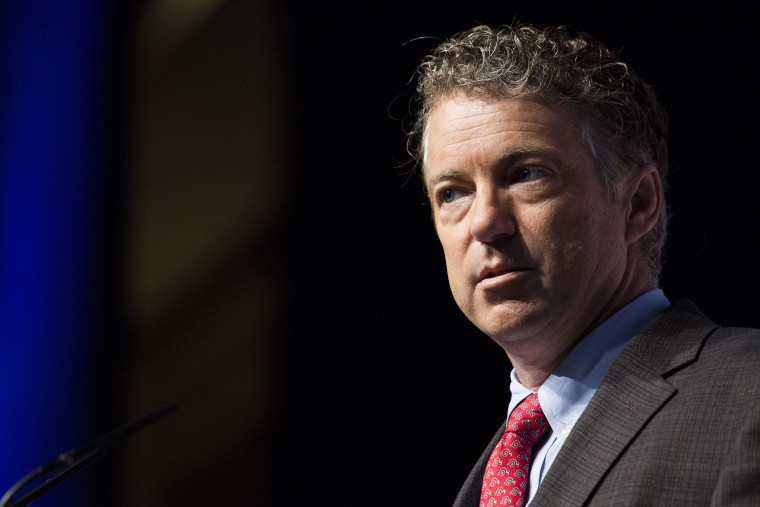You haven’t really seen Rand Paul speak until you’ve seen Rand Paul speak to libertarians. The Kentucky Republican senator comes alive in front of a like-minded audience, cracking jokes, jumping freely across his favorite topics and soaking up applause at every turn.
Paul’s speech at the Liberty Political Action Conference, a gathering of activists aligned with his father Ron Paul’s liberty movement, was no exception, opening with a freewheeling ode to Constitution Week.
“Barack Obama celebrated by doing one more unconstitutional thing: He started an unconstitutional war this week,” he said. “That’s not an unusual week for him.”
On civil rights, he went over some of his recent passion projects, including restoring voting rights for felons and confronting police brutality.
"I like Rand, my hesitation is that I want to see what he stands for ... The question is where are the compromises."'
“Was anybody else bothered by the sight of mine-resistant vehicles and guns pointed at unarmed men in Ferguson?” he asked, referring to the sometimes violent confrontations between police and protestors in a St. Louis suburb last month following a local police officer's shooting death of unarmed black teenager Michael Brown.
Paul ended with a phrase that sounded right at home on a presidential bumper sticker: “Freedom is popular. Bring it on.”
Paul was undeniably the man of the hour, but there was also a tension in the air among the true believers at LPAC. On the one hand he’s almost certainly the movement’s best chance to put one of its own into the White House in 2016, especially given what looks to be a wide open Republican field with no clear frontrunner. On the other hand, the principled activists who powered his father Ron Paul's overachieving 2008 and 2012 campaigns are nervous about what parts of their platform the younger Paul might need to leave behind in the process.
"I like Rand, my hesitation is that I want to see what he stands for,” Linc Austin, who traveled from Nashville, told msnbc. “It might be the only way you can do it. He won't win by sticking with the Ron Paul platform all the way. The question is where are the compromises."
Paul has never fully embraced his father’s policy platform, opting for a slightly more hawkish brand of foreign policy and distancing himself from some of the more fringe figures that the elder Paul, a former Texas congressman, is comfortable associating himself with. In recent days, Rand Paul took perhaps his boldest leap yet, overcoming his skepticism of military engagement in the Middle East to back an air campaign aimed at destroying the Islamic State.
PHOTO ESSAY: Syria’s tragic descent
Libertarian activists, however, are often characterized by an extreme reluctance to get entangled in conflicts abroad. The elder Paul, who shared the stage with his son on Thursday, has warned that entering the fray against ISIS "will just hurt us and it will end when we go bankrupt.” Kentucky Republican Rep. Thomas Massie, another libertarian hero who spoke at LPAC, has also criticized the airstrikes.
"Someone must have said to him ‘Don’t end up like your dad.'"'
Bryan Simonson, a data analyst from Seattle, told msnbc before the speeches began that he preferred the U.S. “stayed out of foreign policy messes,” but he was willing to tolerate some straying from Paul.
“Yeah I'm worried, but not more than I have been,” Simonson said. “I don't think he's changed that much."
The political upside of Paul’s move was clear. Republicans overwhelmingly support strikes against ISIS in polls, seeing the group as a terrorist threat to America and to Christian minorities in the Middle East. Taking a hard line against ISIS could boost Paul’s appeal to voters like Josh Dodd, an attendee from Alabama who said he was interested in the liberty movement but uneasy with its foreign policy positions.
“That definitely helped,” Dodd said of Paul’s new take on ISIS. “We need to limit ourselves and I don't want to arm the rebels in Syria, but I do think we need to be involved in Iraq.”
Paul has done his best to reassure his backers that despite his support for airstrikes, he still is the same non-interventionist he’s presented himself as in the past. In a barnburner speech on the Senate floor Thursday, he lit into “barnacled enablers of war,” slammed President Obama for not requesting a vote to authorize military action, and decried legislation to arm and train moderate Syrian rebels, which passed that evening.
But the ISIS conflict is perhaps the biggest test yet for Paul, especially if it continues to drag on into the presidential election season. Already Paul has had to reverse himself on another popular issue among libertarians, ending all foreign aid, in order to mollify critics who pointed out that Israel is the biggest recipient of American support. He also broke with many of his core supporters by backing Minority Leader Mitch McConnell, a champion of the Wall Street bailout and PATRIOT Act (both viscerally loathed by libertarians), over tea party insurgent Matt Bevin in a Republican primary in Kentucky earlier this year.
"Someone must have said to him 'Don't end up like your dad,'” Dylan Stephenson, an LPAC attendee, told msnbc. “I still think he understands Israel doesn't need our money. They have nuclear weapons, there's no reason they can't support themselves."
Given the likely Republican field, however, libertarians might not have much of a choice but to trust that he knows what he’s doing.
"For better or worse, he's the best option for foreign policy doves,” Simonson said.
